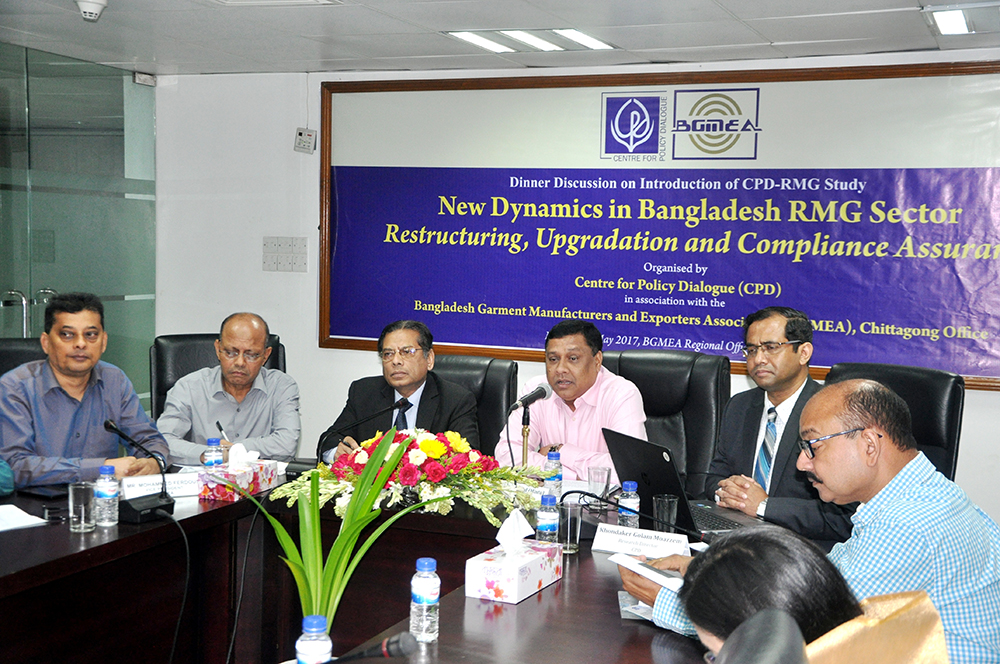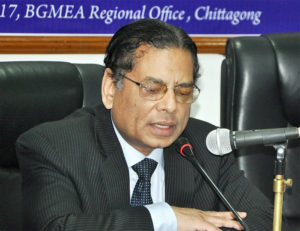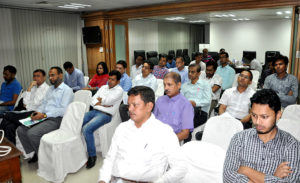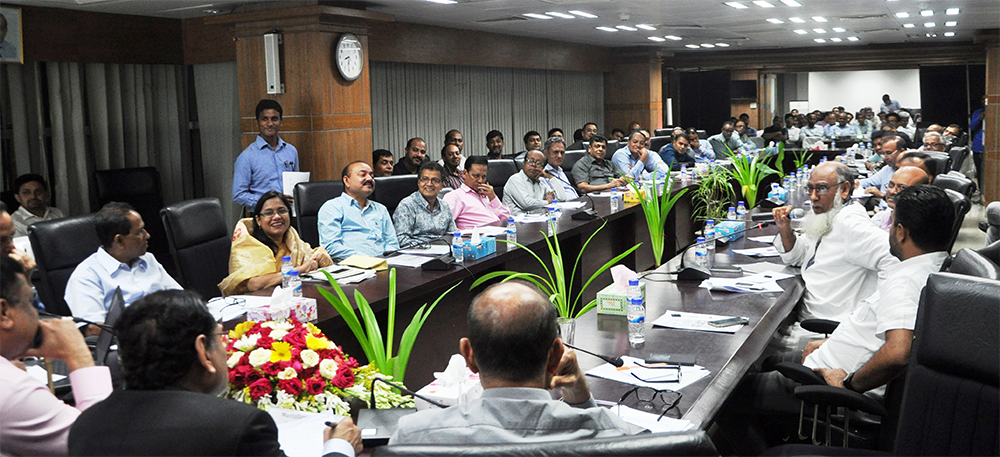
Bangladesh’s ready-made garment industry is facing new challenges. While owners have to make a huge investment for remediation and other compliance issues, their competitors are trying to increase their international apparel market share by technological up-gradation and market diversification. Although they are investing hugely on remediation works and worker’s safety, they are not getting fair prices from the international buyers. However, there are also potentials as China is gradually moving away from its supremacy over the manufacture of low-end apparel. A large-scale study on the RMG industry can help policy makers, industry owners, and other stakeholders understand the future challenges, potentials and the strategies the Bangladeshi RMG industry needs to take in the coming days.
The observations were made at a discussion on Introduction to the CPD-RMG study-New Dynamics in Bangladesh RMG Sector: Restructuring, Upgradation and Compliance held on Monday (15, May) at BGMEA Chittagong regional office. Centre for Policy Dialogue in association with BGMEA Chittagong regional office organized the discussion. CPD Distinguished Fellow Professor Mustafizur Rahman chaired the event while CPD Research director Dr Khondaker Golam Moazzem gave a presentation on the CPD RMG study. BGMEA first vice president Mr. Moinuddin Ahmed, Ms Munira Rahman, Senior Policy Advisor, German Development Co-operation (GIZ), BGMEA former vice presidents and garment factory owners spoke at the discussion. BGMEA leaders and garment owners thanked CPD for undertaking the study on garment industry and for including Chittagong in the study. They agreed to cooperate with CPD in the research. Some 71 representatives from 65 factories attended the discussion.
 BGMEA first vice president Mr. Moinuddin Ahmed began his speech by thanking CPD for their study on RMG industry. He said that RMG owners in Chittagong are struggling in the last couple of years and Chittagong’s share in the total RMG export is falling. He said that many factories were shut down in the last couple of months for compliance and other issues. The BGMEA leader said that it is possible to reach $50 billion export target if everyone works together.
BGMEA first vice president Mr. Moinuddin Ahmed began his speech by thanking CPD for their study on RMG industry. He said that RMG owners in Chittagong are struggling in the last couple of years and Chittagong’s share in the total RMG export is falling. He said that many factories were shut down in the last couple of months for compliance and other issues. The BGMEA leader said that it is possible to reach $50 billion export target if everyone works together.
In his presentation, CPD research director Dr Khondaker Golam Moazzem said that the challenges Bangladesh’s RMG industry is going to face in the coming days are new and the industry needs to take new strategies to overcome the challenges. Mentioning that after upgradation from the LDC, the industry owners will not get tax free export facilities in many countries, he said that the industry needs to prepare themselves now to face post-LDC challenges. He said that there are also challenges in exporting to the EU market in the post Brexit time. Dr Moazzem said that the industry needs to work a lot on the mid-level management skill development in the coming days. Mentioning that many factories are now producing only low-end products, he said that in the future, these factories will not get orders on this type of products as many countries are emerging now to produce low-end products. He suggested that the industry needs to think about product diversification.
 CPD Distinguished Fellow Professor Mustafizur Rahman began his speech by praising the RMG industry owners, workers and the government for their post-Rana Plaza efforts. He said that the efforts owners, government, and other stakeholders have taken so far as part of the post-Rana Plaza initiatives are satisfactory. However, he said that more things need to be done to make the industry sustainable. He said that Bangladesh’s RMG industry goes through large scale restructuring and a study is needed to understand future challenges and potentials. Mentioning that Bangladesh’s neighboring countries are working to increase their international apparel market share in a planned way by giving incentives to owners and technological upgradations and many other competitors are emerging, he said that Bangladesh’s RMG industry needs better planning for the coming days. Professor Mustafizur stressed on value addition from the local market and said that the industry needs to improve both forward and backward linkage. He said that the industry needs to think seriously about market diversification and product diversification. He concluded his speech by saying that the CPD RMG study will give answers to many questions the owners are facing now and will help the industry to reach its $50 billion export target by 2021.
CPD Distinguished Fellow Professor Mustafizur Rahman began his speech by praising the RMG industry owners, workers and the government for their post-Rana Plaza efforts. He said that the efforts owners, government, and other stakeholders have taken so far as part of the post-Rana Plaza initiatives are satisfactory. However, he said that more things need to be done to make the industry sustainable. He said that Bangladesh’s RMG industry goes through large scale restructuring and a study is needed to understand future challenges and potentials. Mentioning that Bangladesh’s neighboring countries are working to increase their international apparel market share in a planned way by giving incentives to owners and technological upgradations and many other competitors are emerging, he said that Bangladesh’s RMG industry needs better planning for the coming days. Professor Mustafizur stressed on value addition from the local market and said that the industry needs to improve both forward and backward linkage. He said that the industry needs to think seriously about market diversification and product diversification. He concluded his speech by saying that the CPD RMG study will give answers to many questions the owners are facing now and will help the industry to reach its $50 billion export target by 2021.
BGMEA former first vice president Mr. MA Salam said that Bangladesh’s garment industry needs to plan ahead for the future competition in the international apparel market.
BGMEA former first vice President Mr. S M Abu Tayyab said that many insights of Bangladesh’s RMG industry are not available to anyone. He said that a large-scale study can help to understand the industry and the challenges.
Ms Munira Rahman, Senior Policy Advisor, German Development Co-operation (GIZ) said that they are working on a project where all regional apparel making countries are involved. She said that they conduct roundtable in all regional countries on a regular basis and they are working to create a level playing field in the region.
Taking part in the discussions, a number of garment owners shared the problems they are facing. Mr. Mohammad Musa, Managing Director, Modina Garments, said that sometimes they face problems when different organizations talk to workers for the survey in the factory. In reply to his comment, CPD Research Director, Dr Moazzem assured him that CPD will respect the confidentiality of the owners.
Showkat Osman from Precision Knitting Sys said that government should take some initiatives to build some satellite towns for workers. He said that if workers get good accommodation at reasonable costs many problems the industry facing can be solved.
Mr. A.M. Chowdhury Selim from Al-Amin Garments said that bank interest rate for the loan is getting high day by day and this is affecting RMG owners. He said that government should offer loan at low interest rate for RMG owners.
Mr. Mohammad Mohiuddin from BLP Warm Fashion Ltd said that there is a negative attitude towards garment industry and this attitude needs to be changed. He said that government should take initiatives to build some safe dormitories for female garment workers.



